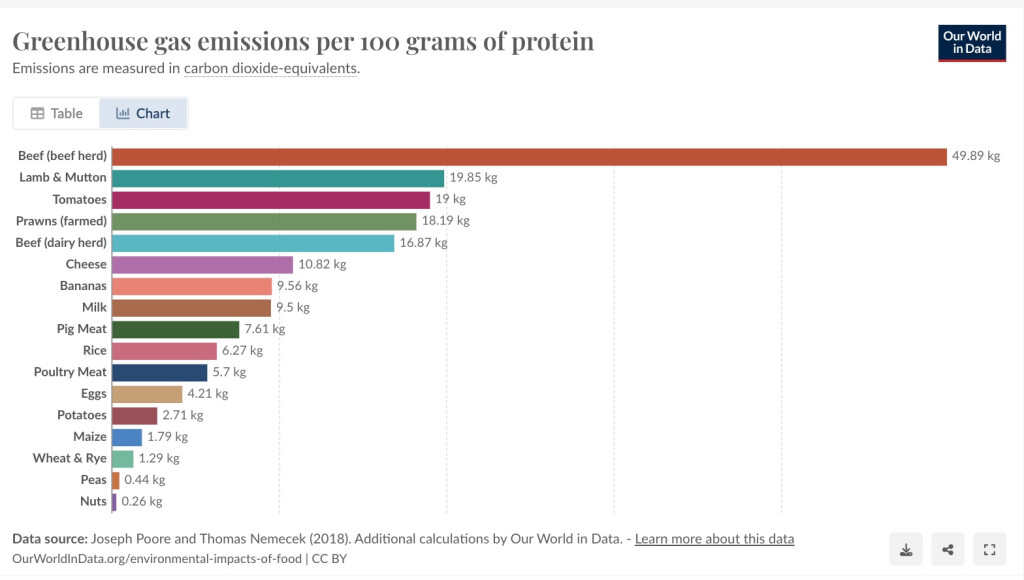Some information…and an invitation
WHAT’S THE BEEF? by Janet Cruse, Creation Care Team of Peace Lutheran Church
A few years ago, my family typically enjoyed an entrée of red meat several times a week. Even though we still enjoy the flavor of beef, we now feel compelled to lean towards other sources of protein. Why? What’s “the beef” with beef?
Emissions: According to many sources, including Clean Water Action, industrially grown and processed beef takes a huge toll on our environment. Cows have a ruminant digestive system that makes them expel damaging methane gas from both ends (think burps). Grain-fed cows require growing enormous quantities of corn, oats & barley which—along with the manure from feedlots—can pollute water with nitrogen and phosphorus. Processing the meat releases even more emissions. Some studies indicate, though, that cows fed on native grasses and processed locally have less of a footprint and might even help sequester carbon. In Sweden red algae seaweed is showing some promise as methane-reducing cow feed.
Still, beef is consistently identified as the meat with the highest carbon footprint by far, as shown on charts that compare it to other foods’ equivalence in such things as serving, protein, or weight. For example:
You can add your food choices to this interactive graph by clicking here and scrolling down the page.
Mitigation: The ELCA Climate Crises Social Statement calls upon us to reduce greenhouse gas emissions through a variety of strategies, including dietary and other personal lifestyle changes. Our PLC Creation Care Team (CCT) promotes plant-based eating and has demonstrated that plant-based food can be varied, delicious and satisfying. Free take-out plant-based food samples will be distributed at the PLC Bazaar on November 19!
An Invitation: I invite you to join my family in reducing our food footprint by making dietary changes in a manner that works for you. Here are some actions to start you on your way:
- Calculate your Food Footprint. Here are a couple online tools: Ecological Footprint Calculator and What is Your Foodprint? – Quiz
- Meatless Monday: A scheduled day prompts us to find and prepare meatless meals. Just a few weeks in and we’ve already gone beyond Meatless Monday with no regrets!
- Reduce Red Meat: While all meats top the charts on environmental damage, replacing beef with chicken or pork can cut your dietary carbon footprint in half (CSPinet). If buying beef, choose organic grass-fed and ethically-produced cuts (Good Meat Project).
- Consider a Different Diet: A typical vegan diet has the lowest estimated average carbon footprint (3.0 pounds of carbon dioxide equivalents per 2,000 calories), followed by vegetarian (5.1), pescatarian (7.3), omnivore (9.8), paleo (11.6), and keto (12.8). (CSPinet)
- Get your Protein: We can get all of our needed amino acids (protein building blocks) by eating a variety of plant-based foods throughout the day (NYTimes). Nuts have been in the news for their high water needs, but here is a positive take on their relative value.
- Eat Local: Try out local Farmers Markets, Urban Farms, CSA farm boxes and learn how to support local farmers and workers at the grocery store.
- Choose Organic: Organically-produced food improves soil and water quality, prohibits synthetic fertilizer and pesticides, and improves conditions for farm workers and livestock (Mayo Clinic and Farmworker Justice)
- Eliminate Food Waste: Eating smaller portions, using up all our stored food and enjoying leftovers can help prevent food waste. Doing so can increase food security, foster productivity and economic efficiency, promote resource and energy conservation, and address climate change. (EPA)
- Use and Promote Regenerative Agriculture: Regenerative agriculture is a holistic land-management practice that uses the power of photosynthesis in plants to sequester carbon in the soil. Click here to create your Climate Victory Garden!
For more information:
– About Creation Care at Peace Lutheran Church
– About our Creation Care Team





